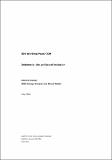Indonesia : the politics of inclusion

Download
Date
2004Author
Rosser, Andrew
Roesad, Kurnya
Edwin, Donni
Metadata
Show full item recordImpact
Abstract
Much commentary on Indonesian politics since the fall of President Suharto in May 1998 has suggested
that Indonesia’s political system has remained just as exclusionary as it was prior to his fall, despite the fact
that it has become much more democratic and decentralised. In contrast to this view, we argue that
Indonesia’s political system has become more inclusive during this time, if only a little more so. The fall of
Suharto and the subsequent process of democratisation has removed key obstacles to organisation by
poor and disadvantaged groups and their NGO allies, making it easier for them to engage in collective
action aimed at achieving pro-poor policy change. By making attainment of political office dependent on
the support of the voting public, many of whom are poor and disadvantaged, these developments have
also created an incentive for politicians to pursue policy changes that favour these groups or at least that
appeal to them. At the same time, however, we argue that poor and disadvantaged groups have not
become major players in the policy-making process. Despite the fall of Suharto and democratisation, these
groups continue to lack the resources possessed by other participants in the policy-making process. While
the politico-bureaucrats and well-connected business groups have been able to exercise influence over
policy by buying support within representative bodies such as parliament and mobile capital controllers,
the IFIs and Western governments have been able to exercise influence over policy by virtue of their
structural power, poor and disadvantaged groups have had to rely on less potent ways of exercising
influence such as holding demonstrations, engaging in lobbying activity, and participating in public
debates. This in turn has constrained their ability to access and influence the policy-making process.
Citation
Rosser, A., K. Roesad & D. Edwin (2004) Indonesia : the politics of inclusion. Working paper series, 229. Brighton: IDS.Is part of series
IDS working papers;229Library catalogue entry
http://bldscat.ids.ac.uk/cgi-bin/koha/opac-detail.pl?biblionumber=148516Rights holder
Institute of Development StudiesCollections
- IDS Research [1671]
